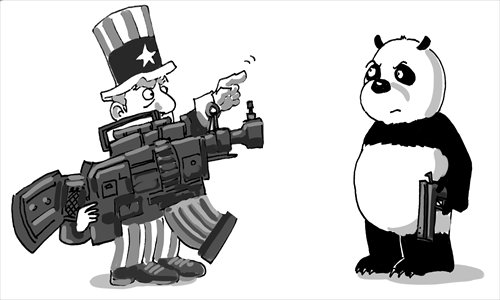Washington hawks hype up Beijing parade

Illustration: Liu Rui/GT
China's upcoming parade for the 70th anniversary of the end of WWII has raised quite a few controversies in the Western hemisphere. Lively debates focus on how many global leaders will show up at the commemorative event, a sign believed to measure China's political leverage, and how many new weapons will make their debut in the parade, which is a standard way to interpret China's military prowess.
The State Council announced on August 21 that 84 percent of the weaponry will be appearing for the first time. This information soon became fodder for the Western media to hype.
The National Interest said on Monday that the missile technology China is about to display aims to "sink the US Navy." Meanwhile, former director of the US Missile Defense Agency Trey Obering warned that China is playing catch-up and has shaken the three major foundations on which US military superiority relies, which are "superior strategic intelligence, surveillance and reconnaissance capabilities; the ability to project power globally; and an overwhelming dominant technological advantage across a spectrum of conflict."
All the rhetoric is familiar. In fact, whenever Chinese military power becomes a topical issue, the same hackneyed remarks return again. They consistently serve one purpose of propaganda, which is to forge and reinforce China's image as a "threat" to the global order.
China has clearly stated its strategic intention of military development - self-defense. The logic of equating the growth of China's military power with a threat is arbitrary, bigoted and lacking in proof. However, thinking of China as a threat is persuasive in the US Congress and government.
By making itself China's imaginary enemy, Washington has well-grounded reasons to demand more budget to enhance its military forces, especially under the circumstances that it is "rebalancing to Asia." The profiteering military corporations, typical groups of vested interests on US turf, need the "China threat" climate to reap more benefits.
If Washington has no intention to deploy its warships and missiles against China directly, China has no reason to take the risks and challenge US military dominance.
US military and China watchers have ignored, deliberately or not, China's own logic of developing military capabilities. For example, China's new missiles and warships are built for off-shore defense.
Before China gained true independence in 1949, the country had paid too little attention to offshore defense, which resulted in a century-long humiliation by global powers. It is natural that China should learn the lesson and avoid a recurrence of history. In the meantime, China has not shown any interest in developing a US-style "ability of projecting power globally."
The US started a war on terror 14 years ago, and has only left chaos and misery in Afghanistan and Iraq. During this period, China's influence greatly increased as its economy continued to boom. After Washington tottered withdrawing itself from the backwaters it created, it intends to recover its weakened leverage by containing China. It will deploy 60 percent of its navy and airborne forces around the Asia-Pacific region by 2020, and many of its current diplomatic and military movements seem to be targeted at China.
However, Washington publicly denies that it wants to contain China, and claims its deployment of resources in this region has not seriously impaired China's core interests. China hopes the US can walk the talk of peace, and Beijing won't show hostility to a friendly gesture.
The US has long harbored suspicions about China's strategic intentions. A large part of their mutual distrust derives from the different stances on this matter.
China thinks a consistent and clear statement of strategic intention is enough to build trust, while the US only believes in a thorough knowledge about its rivals, foes and friends.
However, when asking others to clarify their real strength, the US is unwilling to do so itself, because it needs to keep its military hegemony.
The US seeks absolute security, but does not care about any insecurity felt by other countries.
The author is a captain and research fellow at the Chinese Naval Research Institute. opinion@globaltimes.com.cn